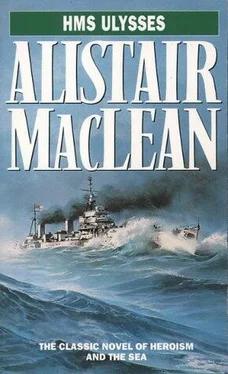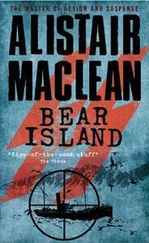Alistair MacLean - HMS Ulysses
Здесь есть возможность читать онлайн «Alistair MacLean - HMS Ulysses» — ознакомительный отрывок электронной книги совершенно бесплатно, а после прочтения отрывка купить полную версию. В некоторых случаях можно слушать аудио, скачать через торрент в формате fb2 и присутствует краткое содержание. Жанр: prose_military, на английском языке. Описание произведения, (предисловие) а так же отзывы посетителей доступны на портале библиотеки ЛибКат.
- Название:HMS Ulysses
- Автор:
- Жанр:
- Год:неизвестен
- ISBN:нет данных
- Рейтинг книги:3 / 5. Голосов: 1
-
Избранное:Добавить в избранное
- Отзывы:
-
Ваша оценка:
- 60
- 1
- 2
- 3
- 4
- 5
HMS Ulysses: краткое содержание, описание и аннотация
Предлагаем к чтению аннотацию, описание, краткое содержание или предисловие (зависит от того, что написал сам автор книги «HMS Ulysses»). Если вы не нашли необходимую информацию о книге — напишите в комментариях, мы постараемся отыскать её.
HMS Ulysses — читать онлайн ознакомительный отрывок
Ниже представлен текст книги, разбитый по страницам. Система сохранения места последней прочитанной страницы, позволяет с удобством читать онлайн бесплатно книгу «HMS Ulysses», без необходимости каждый раз заново искать на чём Вы остановились. Поставьте закладку, и сможете в любой момент перейти на страницу, на которой закончили чтение.
Интервал:
Закладка:
The cold was vicious. The wind was tearing great gouts of water off the wave-tops, driving the atomised spray at bullet speed against fo'c'sle and sides. It was impossible to breathe without turning one's back, without wrapping layers of wool round mouth and nose. Faces blue and white, shaking violently with the cold, neither suggested, neither even thought of going below. Men hypnotised, men fascinated by the tremendous seas, the towering waves, 1,000, 2,000 feet in length, long, sloping on the lee side, steep-walled and terrifying on the other, pushed up by a sixty knot wind and by some mighty force lying far to the north-west. In these gigantic troughs, a church steeple would be lost for ever.
Both men turned round as they heard the screen door crashing behind them. A duffel-coated figure, cursing fluently, fought to shut the heavy door against the pitching of the Ulysses, finally succeeded in heaving the clips home. It was Leading Seaman Doyle, and even though his beard hid three-quarters of what could be seen of his face, he still looked thoroughly disgusted with life.
Carpenter grinned at him. He and Doyle had served a commission together on the China Station. Doyle was a very privileged person.
"Well, well, the Ancient Mariner himself! How are things down below, Doyle?"
"Bloody desperate, sir!" His voice was as lugubrious as his face.
"Cold as charity, sir, and everything all over the bloody place. Cups, saucers, plates in smithereens. Half the crew------"
He broke off suddenly, eyes slowly widening in blank disbelief. He was staring out to sea between Nicholls and Carpenter.
"Well, what about half the crew?... What's the matter, Doyle?'
"Christ Almighty!" Doyle's voice was slow, stunned: it was almost a prayer. "Oh, Christ Almighty!" The voice rose sharply on the last two syllables.
The two officers twisted quickly round. The Defender was climbing-all 500 feet of her was literally climbing up the lee side of a wave that staggered the imagination, whose immensity completely defied immediate comprehension. Even as they watched, before shocked minds could grasp the significance of it all, the Defender reached the crest, hesitated, crazily tilted up her stern till screw and rudder were entirely clear of the water, then crashed down, down, down...
Even at two cable-lengths' distance in that high wind the explosive smash of the plummeting bows came like a thunder-clap. An aeon ticked by, and still the Defender seemed to keep on going under, completely buried now, right back to the bridge island, in a sea of foaming white.
How long she remained like that, arrowed down into the depths of the Arctic, no one could afterwards say: then slowly, agonisingly, incredibly, great rivers of water cascaded off her bows, she broke surface again. Broke surface, to present to frankly disbelieving eyes a spectacle entirely without precedent, anywhere, at any time. The tremendous, instantaneous, up-thrusting pressure of unknown thousands of tons of water had torn the open flight-deck completely off its mountings and bent it backwards, in a great, sweeping "U," almost as far as the bridge. It was a sight to make men doubt their sanity, to leave them stupefied, to leave them speechless, all, that is, except the Kapok Kid.
He rose magnificently to the occasion.
"My word I" he murmured thoughtfully. "That is unusual."
Another such wave, another such shattering impact, and it would have been the end for the Defender. The finest ships, the stoutest, most powerful vessels, are made only of thin, incredibly thin, sheets of metal, and metal, twisted and tortured as was the Defender's, could never have withstood another such impact.
But there were no more such waves, no more such impacts. It had been a freak wave, one of these massive, inexplicable contortions of the sea which have occurred, With blessed infrequency, from time immemorial, in all the great seas of the world whenever Nature wanted to show mankind, an irreverent, over-venturesome mankind, just how puny and pitifully helpless a thing mankind really is.. There were no more such waves and, by five o'clock, although land was still some eight to ten miles away, the squadron had moved into comparative shelter behind the tip of the Langanes peninsula.
From time to time, the captain of the Defender, who seemed to be enjoying himself hugely, sent reassuring messages to the Admiral. He was making a good deal of water, but he was managing nicely, thank you. He thought the latest shape in flight-decks very fashionable, and a vast improvement on the old type; straight flight-dec'cs lacked imagination, he thought, and didn't the Admiral think so too. The vertical type, he stated, provided excellent protection against wind and weather, and would make a splendid sail with the wind in the right quarter. With his last message, to the effect that he thought that it would be rather difficult to fly off planes, a badly-worried Tyndall lost his temper and sent back such a blistering signal that all communications abruptly ceased.
Shortly before six o'clock, the squadron hove-to under the shelter of Langanes, less than two miles offshore Langanes is low-lying, and the wind, still climbing the scale, swept over it and into the bay beyond without a brpak ; but the sea, compared to an hour ago, was mercifully calm, although the ships still rolled heavily. At once the cruisers and the screen vessels-except the Portpatrick and the Gannet-moved alongside the carriers, took oil hoses aboard. Tyndall, reluctantly and after much heart-searching, had decided that the Portpatrick and Gannet were suspect, a potential liability: they were to escort the crippled carrier back to Scapa.
Exhaustion, an exhaustion almost physical, almost tangible, lay heavily over the mess-decks and the wardroom of the Ulysses. Behind lay another sleepless night, another twenty-four hours with peace unknown and rest impossible. With dull tired minds, men heard the broadcast that the Defender, the Portpatrick and the Gannet were to return to Scapa when the weather moderated. Six gone now, only eight left-half the carrier force gone. Little wonder that men felt sick at heart, felt as if they were being deserted, as if, in Riley's phrase, they were being thrown to the wolves.
But there was remarkably little bitterness, a puzzling lack of resentment which, perhaps, sprung only from sheer passive acceptance.
Brooks was aware of it, this inaction of feeling, this unnatural extinction of response, and was lost for a reason to account for it.
Perhaps, he thought, this was the nadir, the last extremity when sick men and sick minds cease altogether to function, the last slow-down of all vital processes, both human and animal. Perhaps this was just the final apathy. His intellect told him that was reasonable, more, it was inevitable... And all the time some fugitive intuition, some evanescent insight, was thrusting upon him an awareness, a dim shadowy awareness of something altogether different; but his mind was too tired to grasp it.
Whatever it was, it wasn't apathy. For a brief moment that evening, a white-hot anger ran through the ship like a flame, then resentment of the injustice which had provoked it. That there had been cause for anger even Vallery admitted; but his hand had been forced.
It had all happened simply enough. During routine evening tests, it had been discovered that the fighting lights on the lower yardarm were not working. Ice was at once suspected as being the cause.
The lower yardarm, on this evening dazzling white and heavily coated with snow and ice, paralleled the deck, sixty feet above it, eighty feet above the waterline. The fighting lights were suspended below the outer tip: to work on these, a man had either to sit on the yardarm-a most uncomfortable position as the heavy steel W.T. transmission aerial was bolted to its upper length-or in a bosun's chair suspended from the yardarm. It was a difficult enough task at any time: tonight, it had to be done with the maximum speed, because the repairs would interrupt radio transmission-the 3,000-volt steel "Safe-to-Transmit" boards (which broke the electrical ckcuits) had to be withdrawn and left in the keeping of the Officer of the Watch during the repair: it had to be done-very precise, finicky work had to be done-in that sub-zero temperature: it had to be done on that slippery, glass-smooth yardarm, with the Ulysses rolling regularly through a thirty-degree arc: the job was more than ordinarily difficult, it was highly dangerous.
Читать дальшеИнтервал:
Закладка:
Похожие книги на «HMS Ulysses»
Представляем Вашему вниманию похожие книги на «HMS Ulysses» списком для выбора. Мы отобрали схожую по названию и смыслу литературу в надежде предоставить читателям больше вариантов отыскать новые, интересные, ещё непрочитанные произведения.
Обсуждение, отзывы о книге «HMS Ulysses» и просто собственные мнения читателей. Оставьте ваши комментарии, напишите, что Вы думаете о произведении, его смысле или главных героях. Укажите что конкретно понравилось, а что нет, и почему Вы так считаете.












